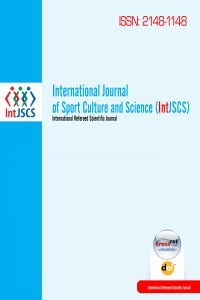13 - 16 Yaş Spor Yapan ve Spora Yeni Başlayan Çocukların Çoklu Zekâ Alanlarının Karşılaştırılması
Bu araştırma, spor yapan ve spora yeni başlayan çocukların çoklu zekâ alanlarının karşılaştırılması amacıyla planlanmıştır. Araştırmada tarama modeli kullanılmıştır. Araştırma kapsamında 2013 yaz dönemi kurslarındaki yaş ortalaması xyaş=15.27±0.90 olan 156 gönüllü çocuk çalışma grubunu oluşturmaktadır. Çocukların demografik bilgilerini elde etmek için kişisel bilgi formu ve çoklu zekâ alanları ile ilgili verileri değerlendirilmek üzere veriler toplanmıştır. Verilerin analizinde SPSS veri analizi programından yararlanılmıştır. Frekans, ortalama, standart sapma değerleri elde edilmiş, ayrıca verilerin normal dağılımları dikkate alınarak vardamsal istatistiksel tekniklerden Bağımsız Örneklem T-Testi kullanılmıştır. Anlamlılık düzeyi p
Anahtar Kelimeler:
Spor, Çoklu Zekâ, Çocuk
The Comparison of Multiple Intelligence Levels of 13 - 16 Years Old Athlete and Non-Athlete Children
The purpose of the study was to compare the multiple intelligence levels of athlete children and new registered children to summer sport courses. Screening model was used in the study. The research included 156 voluntary children attending to 2013 summer term sport courses (x age = 15.27 ± 0.90). Children's personal information form to obtain demographic information and data on multiple intelligences data were collected for evaluation. Data analysis software SPSS was used for data analysis. Frequency, mean, standard deviation values were obtained, as well as inferential statistical techniques, considering the normaldistribution of the data from the independent samples t-test was used. Significance level of p<0.05 was considered.Considering the findings of the study, verbal / linguistic intelligence,physical /kinesthetic intelligence, and social / interpersonal communication in favor of athletes in the areas of intelligence differences were detected (p <0.05).As a result, important information gathered from this study pointing out that there is significant differences between multiple intelligence development of athlete and non-athlete children. The children at development ages should be supported to attend regular sport activities.
Keywords:
-,
___
- Açıkgöz, Ün, K., (2003). Active Learning, Eğitim Dünyası Publishing, 3. Press, İzmir.
- Altınok, E. (2008). Investigating Multiple Intelligence Areas of the Physical Education Students According to Some Changeables, (Unpublished Graduate Thesis). Konya: Selçuk University, Institute of Health Sciences.
- Armstrong, T. (1994). Multiple Intelligences in the Classroom, Virginia: Association for Supervision and Curriculum Development Alexandria
- Armstrong, T. (2003). The multiple intelligences of reading and writing, Alexandria, VA: Association for Supervision and Curriculum Development
- Bayrak, Ç. Çeliksoy, M.A. ve Çeliksoy, S. (2005). Students’ Intelligence Profiles and Their Connections with Talent Entrance Exams who study in Physical Education And Sport Institution of High School, 10-11 June, Bursa: 4. National Symposium of Physical Education and Sport Teaching.
- Demirci E., Demirci N., Toptaşdemirci P., (2006). Research on 1. Rank Elemantary School Teachers’ Opinions About How Effective Are The Games On Child’s Deveopment, 9. Book of Congress of International Sport Sciences, Nobel Publishing, Muğla University.
- Gardner, H. (1999). Intelligence reframed: Multiple intelligences for the 21th century, New York: Basic Books
- Gardner, H., (2004). Intelligence Reframed: Multiple Intelligence Theory, Translator : Ebru Kılıç, Alfa Publishing, İstanbul
- Gardner, H., (2006). Multiple intelligences: New horizons. New York: Basic Books
- Gottfredson, L.S. (1997). Mainstream Sience on Intelligence: An Editorial With 52 signatories, History and Bibliography, Intelligence Journal 24 (1) p. 13–23
- Hoşgörür, V. ve Katrancı, M. (2007). Students’ Superior Intelligence Areas who studies Physical Education and Sport Teaching (Kırıkkale University Faculty of Education), Ondokuz Mayıs University Faculty of Education Journal, 24, page.: 33-42.
- Kurtçuoğlu, S. (2007). The Effect of Multiple Intelligence Theory which is Applied about High School 11. Grade Biology Lesson Digestive System on Students’ Success, Unpublished Postgraduate Thesis, Gazi University Faculty of Education Sciences, Ankara
- Özden, Y. (2003). Learning and Teaching, Ankara: Pegem A Publishing
- Ramadan, Eyyam R. Meneviş İ. Doğruer, N. (2010). Connection Between Multiple Intelligence and Academic Success, International Conference on New Trends in Education and Their Implications, 11-13 November, Antalya-Turkey, p.916-919
- ISSN: 2148-1148
- Başlangıç: 2013
- Yayıncı: Uluslararası Bilim Kültür ve Spor Derneği (UBİKS)
Sayıdaki Diğer Makaleler
13 - 16 Yaş Spor Yapan ve Spora Yeni Başlayan Çocukların Çoklu Zekâ Alanlarının Karşılaştırılması
Tamer BOZKUŞ, Zeynep EROL, Gürkan ELÇİ, Selçuk BOZKUŞ
Gülsüm BAŞTUĞ, Sabri METİN, Erkan BİNGÖL
Hosein HEYDARI, Linda DUFFY, Rokhsareh BADAMI, Bahman BALUCH
Eğlenceli Atletizm Antrenman Programının 12-14 Yaş Arası Çocuklarda Özgüven Düzeyine Etkisi
Erkan YARIMKAYA, Mehibe AKANDERE
The Function of Bazaar in the Modern World
The discovery of new Greeks. The cases of Gagauz in Moldova and "Pontians" in Turkey
Nesic GORAN, Nikola MAJSTOROVIC, Nedzad OSMANKAC, Josko MILENKOSKI, Serdar USLU
A Different Perspective to Fine Art High School Students in Emotional Intelligence
